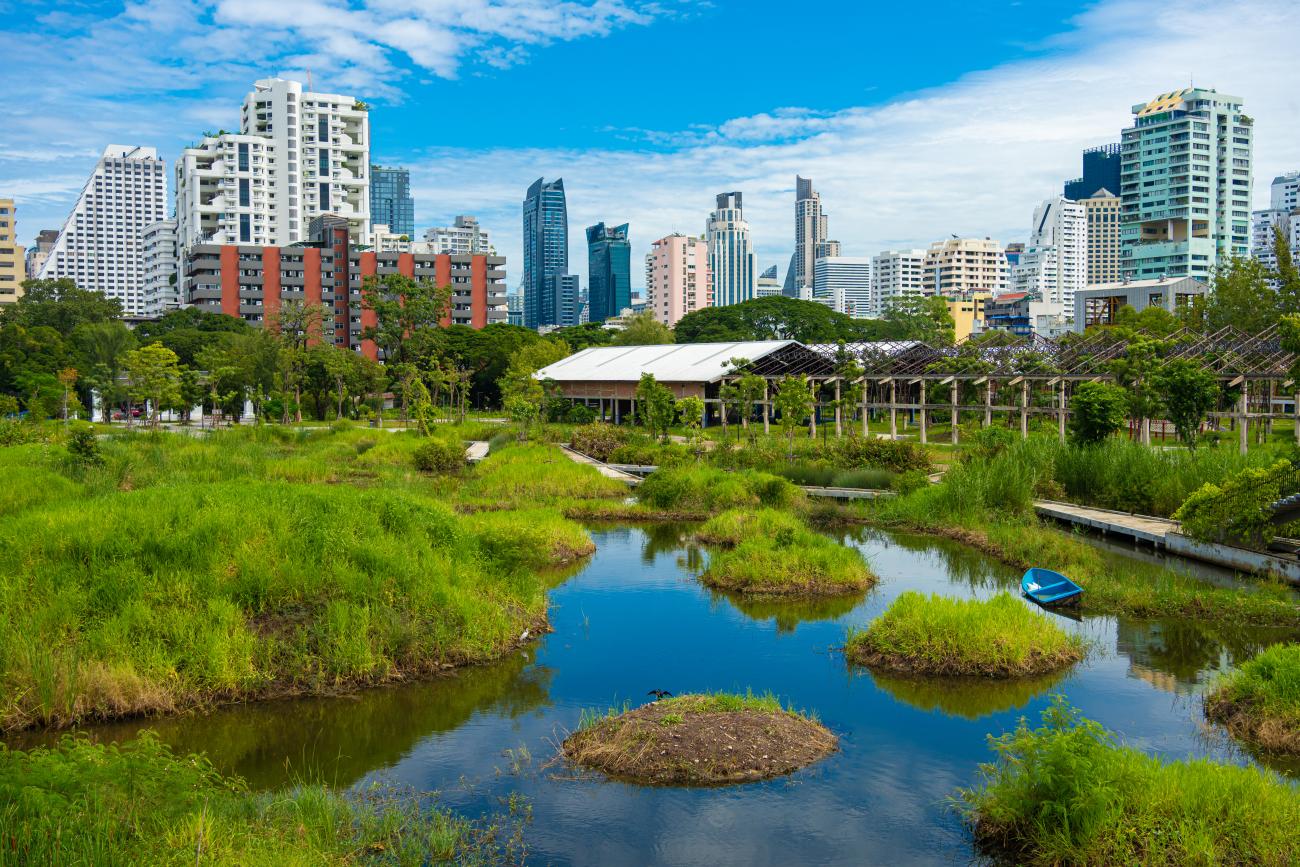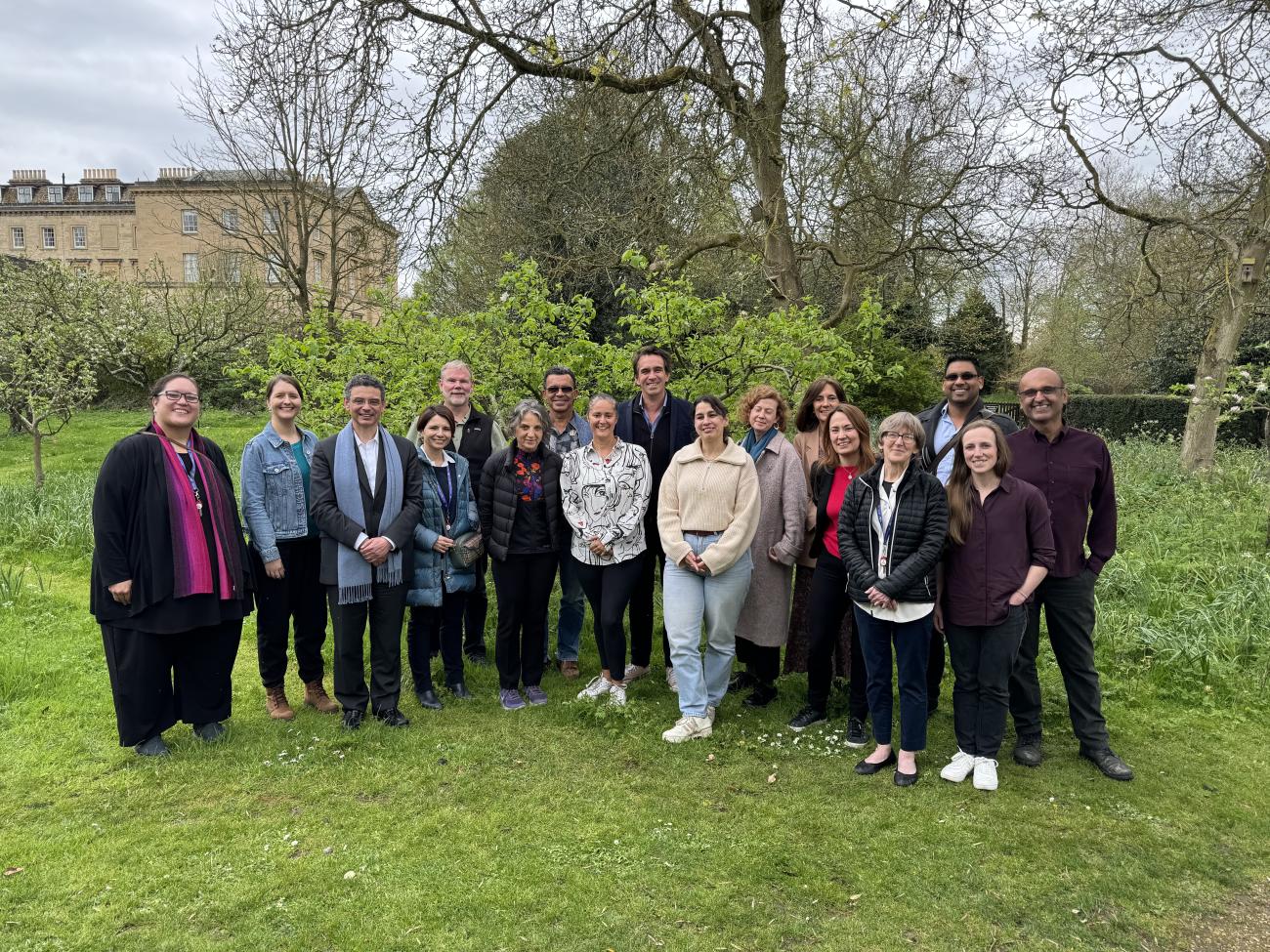Researchers at the Environmental Change Institute and its affiliated Leverhulme Centre for Nature Recovery have collaborated with the United Nations Development Programme to propose a hopeful and practical new approach to drive stronger action for nature.
As the world faces an escalating planetary crisis, a new paper published today in Nature offers something we don’t often hear - hope. Rather than focussing on what we’re doing wrong, the paper proposes a bold new way forward; a global framework that measures how well people and nature are thriving together.
The paper, titled “An Aspirational Approach to Planetary Futures,” is the result of a groundbreaking international collaboration led by the United Nations Development Programme and researchers, including Professor Yadvinder Malhi and Dr Samira Barzin from the ECI’s and its collaborative Leverhulme Centre for Nature Recovery, as well as ECI Visiting Research Fellow Prof Sandra Diaz.

Benjakitti Forest Park in the centre of Bangkok, Thailand, is a former tobacco factory site which has been transformed into a low maintenance green lung that regulates stormwater, cleanses contaminated water, provides habitats for wildlife, and has created the largest public space for the dense population
The team calls for the creation of a “Nature Relationship Index” to sit alongside the Human Development Index (HDI). The aim is to track how countries are improving human relationships with the rest of life on Earth, including a thriving and accessible nature, using natural resources responsibly, and protecting ecosystems – turning these into measurable goals for progress.
Their message is simple yet radical: the way we talk about and measure progress must change, because current measures like GDP, and even the HDI, do not account for how we relate to the rest of life on Earth. Without raising the bar for progress to include all life on Earth, nature’s decline will continue, with consequences for all of us.
Pedro Conceição, Director of the UNDP Human Development Report Office, and contributing author, said:
For decades, the human development approach has inspired global progress by focusing on people’s abilities to lead the lives they value and have reason to value: living longer, healthier lives with access to knowledge, and enjoying a decent standard of living.
“However, in the face of today’s dangerous planetary change, we must raise our ambitions, and that means envisioning progress and development to include healthy and mutually beneficial relationships with the living world.”
At the core of this vision is a bold new idea: the Nature Relationship Index (NRI)—a global metric designed to complement the HDI, and capture the quality of a nation’s relationship with nature. It would assess how well countries are caring for ecosystems, ensuring equitable access to nature, and protecting it from harm. In other words: countries investing in shared spaces for nature and people, clean air and water, and restoring ecosystems could see its NRI rise, rewarding positive action rather than just recording decline.

The Nature Relationship Index (NRI) emerged from a workshop at the University of Oxford, led by the UNDP Human Development Report Office in collaboration with experts in conservation, environmental science, and human development.
The NRI is set to debut in the 2026 Human Development Report, with the long-term goal of regular country-level updates, just like the HDI. The hope? To turn the tide—from reacting to ecological collapse, to actively building a future where both people and the planet can flourish.
Prof Erle Ellis, lead author of the paper and Professor at the University of Maryland Baltimore County and Oxford Martin School Fellow at the University of Oxford, said: “This isn’t the usual environmental messaging about limiting the damage or staving off disaster.
“What we’re proposing is a shift from narratives of environmental harm and failure to stories and evidence that our societies have the capabilities to produce better futures for all life on Earth – and that in many ways we already have. By expanding human development to include healthy relationships among people and the rest of life on Earth, we hope to motivate whole new levels of collaboration and innovation across the planet.”
Rather than leaning solely on fear-driven warnings of environmental doom, the paper urges a shift to storytelling and strategies grounded in human potential—our shared aspirations for clean air, thriving wildlife, green spaces for everyone, and connection. These, the authors argue, are powerful tools for unlocking global action.
Yadvinder Malhi, co-author and Director of the ECI's Leverhulme Centre for Nature Recovery highlighted the urgency and opportunity behind the initiative:
There is a need for clear-eyed but hopeful and actionable visions of the future. The planetary crisis is profound, but it’s also an invitation. An invitation to rethink our relationship with the Earth, not as relentless consumers of a commodified and exploited nature, but as integral participants in our mutual co-flourishing with the rest of the natural world.”
This new framework marks a crucial turning point for global development. By embedding this aspirational vision into policies and everyday decisions, the authors call on all of us—governments, communities, and individuals—to take real, measurable steps towards making life on this planet better for all of us. Because the future we want depends on what we do today.
A future where people and nature thrive together is possible. The question now is: will we make it happen?
The Nature Relationship Index at a glance
- Will debut in the 2026 UN Human Development Report
- Expands the aspirational space of development to include thriving human-nature relationships
- Provides a globally accepted, values-based metric to guide and celebrate progress toward more sustainable futures
- Aims to shift focus from avoiding environmental harm to fostering aspirational, positive relationships with nature
- Seeks to empower societies to pursue a future where people and nature thrive together
- Inspired by the HDI, the NRI tracks open-ended progress
- Measures how well societies balance human development with caring, sustainable interactions with nature
- Three Core Dimensions of the NRI:
- Nature is Thriving and Accessible: Measures extent and access to natural areas
- Nature is Used with Care: Evaluates the sustainability of resource use and impacts like emission
- Nature is Safeguarded: Assesses legal and institutional commitments to protecting nature.
Read the article in full in Nature: An aspirational approach to planetary futures
Professor Yadvinder Malhi explains why he sees great potential in the NRI in this short video.


